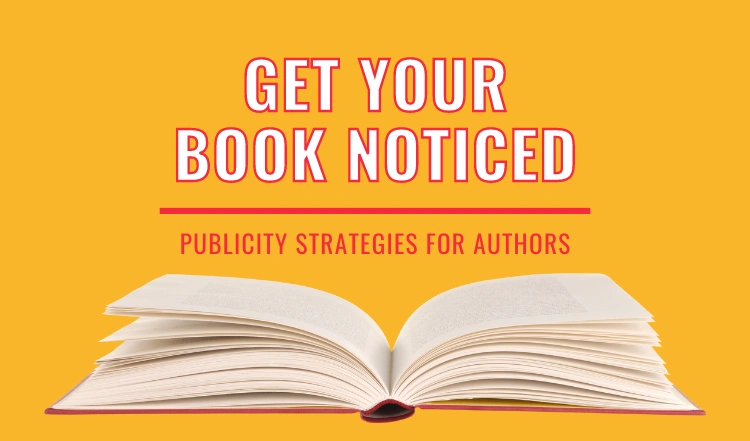Once your book is written and published, or self-published, all you can think about is sales. How’s that massive time-commitment and labor of love selling on Amazon?
Like 99% of authors these days, you’re probably not hitting Amazon’s bestselling lists. After all, it can be challenging to stand out in a crowded market, but there are some strategies you can use to increase your book sales.
One thing you can do is focus on building your online presence.
Social media platforms like Twitter, Facebook, and Instagram can be great tools for connecting with potential readers and promoting your book. Share excerpts from your book, host giveaways, and engage with your followers to build a strong online following.
You may want to consider outright advertising your book on Facebook or Pinterest.
Pinterest can be an extraordinary platform for authors to boost their book sales. Some strong pins sharing a few short excerpts along with a few video pins that act almost like a preview of your book can have a profound impact on sales.
Another strategy is to reach out to book bloggers and book reviewers.
Many bloggers and reviewers are always on the lookout for new books to read and review, so don’t be afraid to pitch your book to them. If they like your book, they may write a review or feature it on their blog, which can help you reach a wider audience.
It’s also a good idea to offer your book at a discounted price for a limited time.
Quite often, a bit of savings can entice readers who may be on the fence about purchasing your book to take the plunge and buy it.
Offering a discount on your book can not only help you sell more copies, but it can also lead to more reviews. Reviews are critical for book sales, as they provide social proof and help potential readers determine whether your book is worth their time and money.
When you offer a discount on your book, you’re essentially incentivizing readers to buy it. This can be particularly effective for readers who may be on the fence about purchasing your book. Once they’ve purchased and read your book, they may be more inclined to leave a review.
Reviews are important because they can impact your book’s visibility and ranking on online marketplaces like Amazon. Books with more reviews are often prioritized in search results and recommended to customers, which can lead to more sales.
It’s important to note that not all reviews are created equal. While positive reviews are obviously great, even negative reviews can be helpful. They provide valuable feedback that can help you improve your writing and make your next book even better. Additionally, having a mix of positive and negative reviews can make your book appear more authentic and balanced to potential readers.
One way to encourage readers to leave reviews is to include a note at the end of your book asking them to leave a review if they enjoyed it. You can also reach out to readers who have purchased your book and ask them to leave a review.
Offering a discount on your book can lead to more sales and reviews, which can help increase your book’s visibility and attract more readers, but don’t underestimate the power of reviews when it comes to selling more books as well.
Getting interviewed by the media can be a great way to generate publicity for your book and reach a wider audience.
Right now you’re probably thinking, but I’m not Stephen King, who would want to interview me? Sadly, that’s the reason why most authors don’t win themselves any publicity because they don’t think they have anything to contribute. But here’s the reality, you wrote a book about a specific topic, whether fiction or non-fiction, that means you have something to say.
You just need to find your voice and determine what you can offer. Perhaps start simply by focusing on your experiences as a first-time author with your specific background (veteran, wife, mother, husband, retired, specific hobby enthusiast, etc.) and pitch that.
Here are some tips for landing media interviews:
- Identify relevant media outlets: Research media outlets that would be a good fit for your book and target audience. This might include local newspapers, magazines, radio shows, and podcasts.
- Craft a compelling pitch: Once you’ve identified relevant media outlets, craft a pitch that highlights the most interesting and newsworthy aspects of your book. Be sure to focus on how your book will provide value to their audience.
- Reach out to journalists and producers: Use social media and email to reach out to journalists and producers at your target media outlets. Introduce yourself, pitch your book, and provide any relevant materials they might need, such as a press release or author bio.
- Be responsive and professional: If a journalist or producer expresses interest in your book, be responsive and professional in your communications. Be prepared to answer questions and provide additional information about your book and your background as an author.
- Prepare for the interview: Once you’ve landed an interview, make sure you’re well-prepared. Research the journalist or producer, anticipate the types of questions they might ask, and practice your answers. It’s also a good idea to have a few key talking points or sound bites ready to go.
- Follow up and say thank you: After the interview, follow up with the journalist or producer to thank them for their time and the opportunity to be featured. This can help build relationships with the media and increase your chances of being featured again in the future.
The media can become your best friend if you work them correctly. Every media outlet whether online, offline or on TV has a lot of space and time to fill these days in the 24/7 news cycle and that includes even niche bloggers and podcasters.
Help them fill that space while increasing your own visibility and, hopefully, selling some books in the process.
Guesting on podcasts can be a fantastic way for you to reach a new audience and promote your book.

Beyond boosting your online book sales, guesting on podcasts can build up your brand, visibility, and increase your audience’s awareness of your book. The more podcasts you guest on, the better you’ll get at it, so get out there!
Here are some tips for using podcast guesting to help sell your book:
- Identify relevant podcasts: Research podcasts that cover topics related to your book and target audience. Look for shows with engaged and enthusiastic audiences who are likely to be interested in your book.
- Pitch yourself as a guest: Once you’ve identified relevant podcasts, pitch yourself as a guest. Reach out to the show’s host via email or social media and introduce yourself and your book. Highlight why you would be a good fit for their show and what value you can provide to their audience.
- Be prepared: If the podcast host invites you to be a guest, be sure to prepare ahead of time. Research the show and the host, and think about the types of questions they might ask. Prepare answers and talking points that highlight the most interesting and newsworthy aspects of your book.
- Promote the podcast episode: Once the episode is live, be sure to promote it on your social media channels and website. Encourage your followers to listen and share the episode with their own networks. This can help increase the visibility of your book and attract new readers.
- Build relationships with podcast hosts: Podcast guesting can be a great way to build relationships with podcast hosts and increase your chances of being invited back as a guest. Be sure to follow up with the host after the episode airs, and thank them for the opportunity to be featured.
By using podcast guesting to promote your book, you can reach a new audience and generate buzz around your work. With a little research and preparation, podcast guesting can be a highly effective marketing strategy.
Lastly, consider hosting a book launch event or book signing.

This can be a great way to connect with readers in person and generate buzz about your book.
Now, don’t expect a big crowd. Even Stephen King has had trouble getting people to show up for in-person events, and he’s, well, Stephen King!
Contact all of your friends and family and reach out to local media outlets and community-based educational and literary organizations (depending on your book’s content) and invite everyone to your signing.
You just want enough people there to grab some compelling photos that will demonstrate on social media and in online ads how popular your book is, which will encourage others to get it.
The Lazy Author's Guide to Generating Publicity and Selling More Books
The Lazy Author’s Guide is more of a strategy. A simple, effective way for authors to sell more books without spending a lot of time or money on marketing.
The strategy involves focusing on a specific audience or niche and building a loyal following within that group.
It’s very similar to what a niche blogger or niche site owner does every day to grow their audience.
By targeting a specific audience, you can create content and marketing materials that speak directly to their interests and needs, making it more likely that they will be interested in your book.
To implement this strategy, you’ll need to start by identifying your target audience.
Think about the demographics, interests, and preferences of the people who are most likely to enjoy your book.
Once you have a clear idea of your target audience, you can start creating content and marketing materials that will appeal to them.
For example, if you’ve written a romance novel, you might focus on building a following among fans of the genre.
You could create social media posts and ads that highlight the romantic themes and elements of your book or connect with romance book bloggers and reviewers to get your book in front of their audiences.
Another key aspect of the Lazy Author’s Strategy is creating a strong author brand.
This means developing a consistent and recognizable image and voice that will help you stand out in the market.
You can do this by creating a website, social media profiles, and other online assets that reflect your personality and writing style.
The Lazy Author’s Strategy is all about finding ways to sell more books with minimal effort. By focusing on a specific audience, creating engaging content, and developing a strong author brand, you can increase your book sales and build a loyal fanbase without spending a lot of time or money on marketing.
Remember, selling more books takes time and effort, but with these strategies, you can increase your book sales and reach a wider audience.





